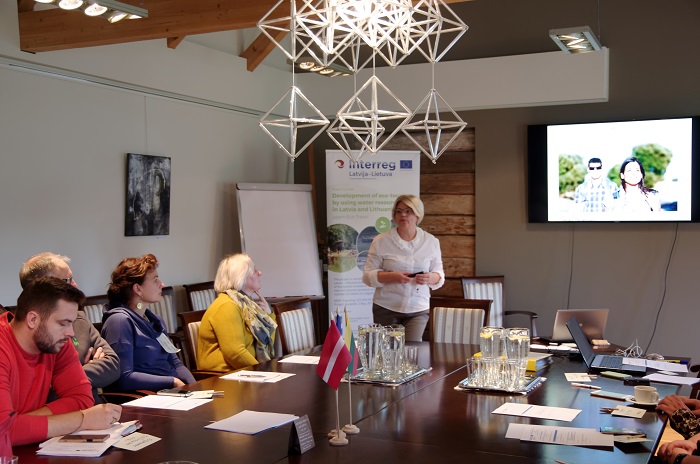-

Bringing neighbours closer
Welcome to the Interreg V-A Latvia–Lithuania Programme 2014–2020!
About the programme -

-

Latvian and Lithuanian tourism sphere entrepreneurs complement the knowledge in the supply of eco tourism services
11 October 2018
On October 10 and 11 a capacity building seminar on eco tourism took place in Anyksciai, Lithuania in the framework of the project “Development of eco tourism by using water resources in Latvia and Lithuania” /Learn Eco Travel/, involving tourism entrepreneurs, guest houses’ and campsites’ owners and tourism information centre specialists. 32 participants from the project partners’ municipalities – Preili, Riebini and Aglona municipalities from Latvia, Moletai and Anyksciai districts, Panevezys, as well as Grazute and Sartu Regional Parks in Lithuania took part in the seminar.
The aim of the seminar was to attract knowledgeable and experienced lecturers from Latvia and Lithuania to eco tourism, to educate the tourism workers about the development of eco tourism, the needs and expectations of modern tourists, to tell how to create an attractive eco tourism offer for visitors and how to attract customers through smart and intelligent marketing.
Lithuanian Hotels and Restaurant Association’s representative Egle Lizaitite informed about sustainable tourism trends worldwide, various eco-labels for tourism offerings, pointing out that there is a greater importance for genuine experience nowadays, communication with local residents, the use of local food products, etc. The participants were introduced with the Lithuanian Hotels and Restaurant Association’s and the Latvian Hotel and Restaurant Association’s jointly implemented project, where, after developed 11 sustainability areas, the places of accommodation and restaurants have been assessed, inviting the participants to think whether their tourism offers meet these criteria and what should be improved.
Vidzeme University of Applied Sciences lecturer, tourism and environmental expert Juris Smalinskis presented the routes developed by the rural tourism association “Rural Traveller” with a special accent on water tourists. Telling about as to what tourism offer and infrastructure should be, so that it is comfortable and attractive for visitors and would promote the development of eco tourism, the lecturer stressed several important aspects that should be taken into account for tourist product providers, including the road signs to the service providing places not only on motorways, but also near water bodies, the landfall-tailored places for exit from the boat, the settlements near the water bodies and the safe place to leave the inventory. J. Smalinskis contested the stereotype that auto travellers are more materially provided and interesting for tourism service providers, as studies have proved the opposite – the velo drivers and those that travel by foot give much greater contribution to the local economy, as they choose to receive goods and services on spot.
The communication expert Liene Kupca educated the participants on the role of smart marketing and social networks for the successful provision of eco tourism entrepreneurship, with particular emphasis on how to create a fascinating story based on the history of the site, searching for the new in present and imagining the future. Liene Kupca stressed also the need to cooperate in the framework of larger regions and cultural areas in order to promote their visibility, so that the information is not fragmented and competitive, but combined, as the wider regional brand will be more noticeable and successful.
Tourism sphere lecturer Ramute Narkuniene described the types of modern tourists, indicating that tourism providers must take into account the wishes of different travellers and expect visitors not to be disappointed without receiving what they have arrived after. The service providers must assume that modern tourist habits have changed – an increased role is given to eco – and sustainable tourism; the niche tourism develops, the travellers become more experienced and plan their own journeys, as well as the role of information technologies and social networks grows.
The seminar participants acknowledged that the seminar can serve both as an inspiration and also calls for a rethinking of their offer. As the participants in the seminar and the lecturers were both from Latvian and Lithuania, there was an opportunity to compare the experience of each neighbouring entrepreneur. According to Evita Pilcikova – the owner of Preili Municipality campsite – recreational site “Duni” near Peleci Lake, there were very valuable examples in the seminar, and they made to think of her offer and the promotion, for example, by means of some event that would attract new visitors.

About the project
The project “Development of eco tourism by using water resources in Latvia and Lithuania”(LEARN ECO TRAVEL) No. LLI-349 is implemented with the support of the Interreg V-A Latvian-Lithuanian programme 2014-2020 from May 2, 2018 till November 1, 2019. The project aims at developing tourism opportunities in Latgale and Aukstaitija, improving recreational sites at water facilities and building new eco-tourism products and services, thereby increasing the number of visitors in the regions of Latvia and Lithuania. The total cost of the project is EUR 618 194,06 – the co-financing of the European Regional Development Fund is EUR 525 464,95 and the co-financing of the project partners – EUR 92 729,11, including Preili Municipality Council co-financing – EUR 24 973,20.
More information about the project – www.latlit.eu or www.preili.lv.
This publication has been prepared with the financial support of the European Union. Preili Municipality is entirely responsible for the content of this publication and it is under no circumstances considered to be the official position of the European Union.
Last updated: 03.11.2025 14:05
